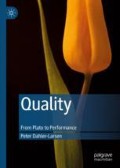Abstract
This chapter analyzes the sociopolitical implications of quality. My assertion is that we live in times where quality without democracy is becoming increasingly pertinent.
Access this chapter
Tax calculation will be finalised at checkout
Purchases are for personal use only
References
Ahrne, Göran, and Nils Brunsson. 2008. Organizing the World. In Transnational Governance, ed. M.-L. Djelic and K. Sahlin-Andersson. Cambridge: Cambridge University Press.
Bache, Ian, and Louise Reardon. 2016. The Politics and Policy of Wellbeing. Cheltenham: Edward Elgar.
Bauman, Zygmunt. 1983. Industrialism, Consumerism and Power. Theory, Culture and Society 1 (3): 32–43.
———. 1987. Legislators and Interpreters. On Modernity, Postmodernity and Intellectuals. Cambridge: Polity Press.
———. 2000. Liquid Modernity. Cambridge: Polity Press.
———. 2001. Consuming Life. Journal of Consumer Culture 1 (1): 9–29.
———. 2002. Det Belejrede Samfund [Society Under Siege]. Copenhagen: Hans Reitzel.
Berger, Peter L., Brigitte Berger, and Hansfried Kellner. 1973. The Homeless Mind: Modernization and Consciousness. New York: Vintage Books.
Bevir, Mark. 2004. Governance and Interpretation: What are the Implications of Postfoundationalism? Public Administration 82 (3): 605–625.
Boltanski, Luc. 2011. Pragmatisk Sociologi [Pragmatic Sociology. A Reader]. Copenhagen: Hans Reitzel.
Boltanski, Luc, and Eve Chiapello. 2007. The New Spirit of Capitalism. London: Verso.
Bowbrick, Peter. 2014. The Economics of Quality, Grades and Brands. New York: Routledge.
Brown, Wendy. 2015. Undoing the Demos. New York: Zone Books.
Brunsson, Nils. 2000. Organizations, Markets and Standardization. In A World of Standards, ed. N. Brunsson and B. Jacobsson. Oxford: Oxford University Press.
Dahler-Larsen, Peter. 2006. Evaluation After Disenchantment? Five Issues Shaping the Role of Evaluation in Society. In Handbook of Evaluation, ed. I.F. Shaw, J.C. Greene, and M.M. Mark, 123–140. Thousand Oaks: Sage.
———. 2012. The Evaluation Society. Stanford: Stanford University Press.
Davies, William. 2011. Knowing the Unknowable: The Epistemological Authority of Innovation Policy Experts. Social Epistemology 25 (4): 401–421.
———. 2015. The Happiness Industry: How the Government and Big Business Sold Us Well-Being. London: Verso.
Jensen, Jacob. 2016. Almenvellets Affortryllelse – Neoliberale Anfægtelser af det Fælles Bedste [The Disenchantment of the Common Good – Neoliberal Contestations of the Common Good]. Slagmark 74 (Fall): 69–85.
Jensen, Jacob, and Niklas Olsen. 2016. Hvad Er Neoliberalisme? Redaktionelt Forord [What Is Neoliberalism? Editorial Foreword]. Slagmark 74 (Fall): 9–22.
Julnes, George, ed. 2012. Promoting Value in the Public Interest: Informing Policies for Judging Value in Evaluation. New Directions for Evaluation, No. 133. San Francisco: Jossey-Bass.
Kauko, Jaakko, Risto Rinne, and Tuomas Takala. 2018. Politics of Quality in Education. A Comparative Study of Brazil, China, and Russia. New York: Routledge.
Kipnis, Andrew B. 2008. Audit Cultures: Neoliberal Governmentality, Socialist Legacy, or Technologies of Governing. American Ethnologist 35 (2): 275–289.
Kushner, Saville. 2017. Evaluative Research Methods: Managing the Complexities of Judgment in the Field. Charlotte: Information Age Publishing.
Mirowski, Philip. 2016. Den politiske bevægelse, der ikke turde ytre sit eget navn [The Political Movement Which Did Not Dare Speak in Its Own Name]. Slagmark 74 (Fall): 33–52.
Morgan, Gareth. 1986. Images of Organization. Thousand Oaks: Sage.
Mörth, Ulrika. 2008. Soft Regulation and Global Democracy. In Transnational Governance, ed. M.-L. Djelic and K. Sahlin-Andersson. Cambridge: Cambridge University Press.
Normand, Romuald. 2016. The Changing Epistemic Governance of European Education, the Fabrication of the Homo Academicus Europeanus? Switzerland: Springer.
Ozga, Jenny, Peter Dahler-Larsen, Christina Segerholm, and Hannu Simola. 2011. Fabricating Quality in Education: Data and Governance in Europe. London: Routledge.
Palonen, Kari. 2002. The History of Concepts as a Style of Political Theorizing: Quentin Skinner’s and Reinhart Koselleck’s Subversion of Normative Political Theory. European Journal of Political Theory 1 (1): 91–106.
———. 2007. Re-thinking Politics: Essays from a Quarter-century. Finnish Political Science Association. Jyväskylä University Printing House.
Pielke, Roger A. 2007. The Honest Broker, Making Sense of Science in Policy and Politics. Cambridge: Cambridge University Press.
Porter, Theodore M. 1994. Making Things Quantitative. Science in Context 7 (3): 389–407.
Prewitt, Kenneth, Thomas A. Schwandt, and Miron L. Straf. 2012. Using Science as Evidence in Public Policy. Washington, DC: National Academies Press.
Rosa, Hartmut. 2003. Social Acceleration: Ethical and Political Consequences of a Desynchronized High–Speed Society. Constellations 10 (1): 3–33.
———. 2005. The Speed of Global Flows and the Pace of Democratic Politics. New Political Science 27 (4): 445–459.
Rosanvallon, Pierre. 2009. Demokratin som Problem [Democracy as the Problem]. Hägersten: TankeKraft Förlag.
Sennett, Richard. 2002. The Corrosion of Character: The Personal Consequences of Work in the New Capitalism. New York: W. W. Norton.
Sørensen, Eva M., and Jacob Torfing. 2009. Making Governance Networks Effective and Democratic through Metagovernance. Public Administration 87 (2): 234–258.
Stark, David. 2009. The Sense of Dissonance, Accounts of Worth in Economic Life. Princeton: Princeton University Press.
Strang, David, and John W. Meyer. 1994. Institutional Conditions for Diffusion. In Institutional Environments and Organizations, ed. W.R. Scott and J.W. Meyer, 100–112. Thousand Oaks: Sage.
Thévenot, Laurent. 2001. Pragmatic Regumes Governing the Engagement with the World. In The Practice Turn in Contemporary Theory, ed. T.R. Schatzki, K.D. Knorr-Cetina, and E. von Savigny, 56–73. London: Routledge.
Vedung, Evert. 1997. Public Policy and Program Evaluation. New Brunswick: Transaction.
Wallenburg, Iris, Julia Quartz, and Roland Bal. 2016. Making Hospitals Governable: Performativity and Institutional Work in Ranking Practices. Administration & Society: 1–27.
Author information
Authors and Affiliations
Corresponding author
Rights and permissions
Copyright information
© 2019 The Author(s)
About this chapter
Cite this chapter
Dahler-Larsen, P. (2019). Quality Without Democracy. In: Quality. Palgrave Macmillan, Cham. https://doi.org/10.1007/978-3-030-10392-7_6
Download citation
DOI: https://doi.org/10.1007/978-3-030-10392-7_6
Published:
Publisher Name: Palgrave Macmillan, Cham
Print ISBN: 978-3-030-10391-0
Online ISBN: 978-3-030-10392-7
eBook Packages: Social SciencesSocial Sciences (R0)

